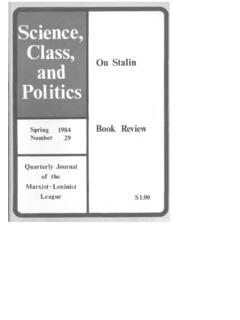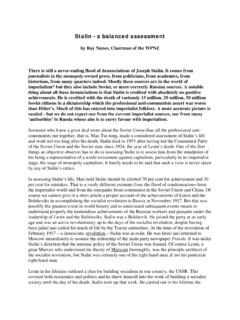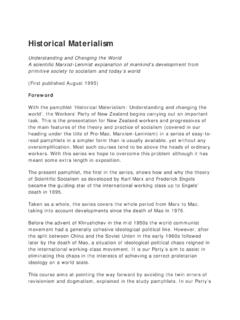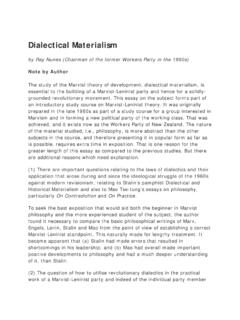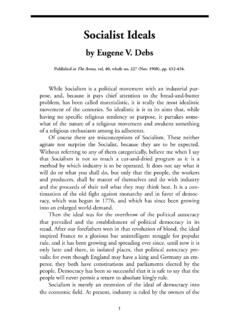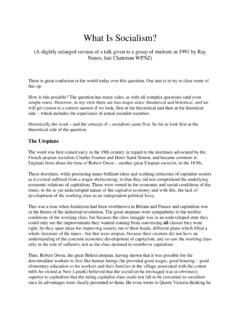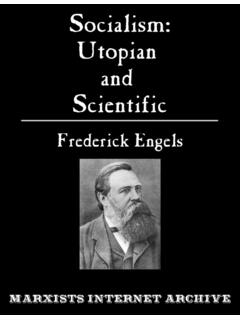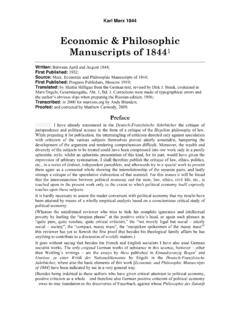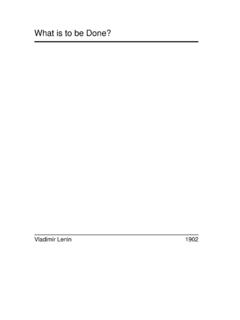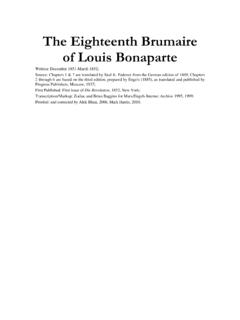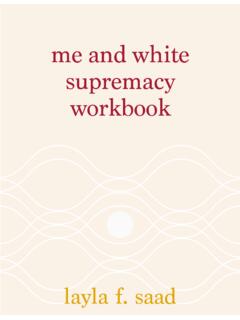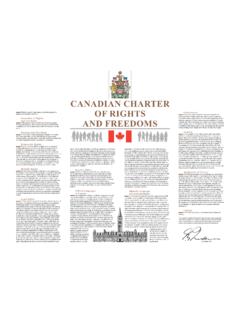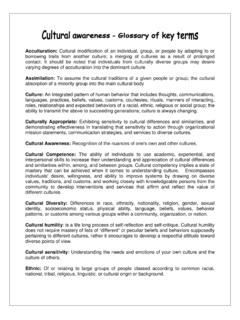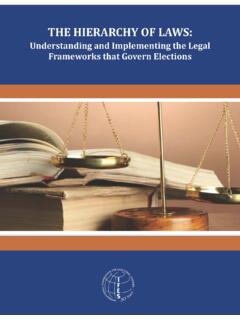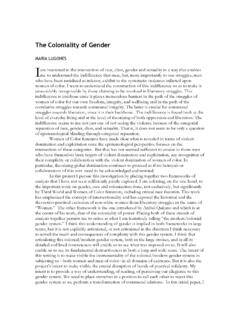Transcription of Origin of the Family, Private Property and the State
1 Friedrich EngelsOrigin of the family , Private Property , and the StateWritten: March-May, 1884;First Published: October 1884, in Hottingen-Zurich;Source: Marx/Engels Selected Works, Volume Three;Translation: The text is essentially the English translation by Alick West published in 1942, but it has been revised against the German text as it appeared in MEW [Marx-Engels Werke] Volume 21, Dietz Verlag 1962, and the spelling of names and other terms has been modernised;Transcription/Markup: Zodiac/Brian Baggins;Online Version: Marx/Engels Internet Archive ( ) 1993, 1999, 2000. Proofed and corrected: Mark Harris 2010 After Marx s death, in rumaging through Marx s manuscripts, Engels came upon Marx s precis of Ancient Society a book by progressive US scholar Lewis Henry Morgan and published in London 1877.
2 The precis was written between 1880-81 and contained Marx s numerous remarks on Morgan as well as passages from other reading the precis, Engels set out to write a special treatise which he saw as fulfilling Marx s will. Working on the book, he used Marx s precis, and some of Morgan s factual material and conclusions. He also made use of many and diverse data gleaned in his own studies of the history of Greece, Rome, Old Ireland, and the Ancient would, of course, become The Origin of the family , Private Property and the State the first edition of which was published October 1884 in wrote The Origin of the family , Private Property and the State in just two months beginning toward the end of March 1884 and completing it by the end of May.
3 It focuses on early human history, following the disintegration of the primitive community and the emergence of a class society based on Private Property . Engels looks into the Origin and essence of the State , and concludes it is bound to wither away leaving a classless : Along with [the classes] the State will inevitably fall. Society, which will reorganise production on the basis of a free and equal association of the producers, will put the whole machinery of State where it will then belong: into the museum of antiquity, by the side of the spinning-wheel and the bronze axe. In 1890, having gathered new material on the history of primitive society, Engels set about preparing a new edition of his book. He studied the latest books on the subject including those of Russian historian Maxim Kovalevsky.
4 (The fourth edition, Stuttgart, 1892, was dedicated to Kovalevsky.) As a result, he introduced a number of changes in his original text and also considerable to the First Edition, 1884In 1894, Engels s book appeared in Russian translation. It was the first of Engels s works published legally in Russia. Lenin would later describe it as one of the fundamental works of modern socialism. Table of ContentsPreface to the First Edition, 1884 .. 4 Preface to the Fourth Edition, 1891 .. 6 I. Stages of Prehistoric Culture.
5 13 II. The family .. 17 III. The Iroquois Gens .. 45 III. The Greek Gens .. 54 V. The Rise of the Athenian State .. 60 VI. The Gens and the State in Rome .. 66 VII.
6 The Gens among Celts and Germans .. 72 VIII. The Formation of the State among Germans .. 80 IX. Barbarism and Civilization .. 86 Preface to the First Edition, 1884 The following chapters are, in a sense, the execution of a bequest. No less a man than Karl Marx had made it one of his future tasks to present the results of Morgan s researches in the light of the conclusions of his own within certain limits, I may say our materialistic examination of history, and thus to make clear their full significance.
7 For Morgan in his own way had discovered afresh in America the materialistic conception of history discovered by Marx forty years ago, and in his comparison of barbarism and civilization it had led him, in the main points, to the same conclusions as Marx. And just as the professional economists in Germany were for years as busy in plagiarizing Capital as they were persistent in attempting to kill it by silence, so Morgan's Ancient Society i received precisely the same treatment from the spokesmen of prehistoric science in England. My work can only provide a slight substitute for what my departed friend no longer had the time to do. But I have the critical notes which he made to his extensive extracts from Morgan, and as far as possible I reproduce them here.
8 According to the materialistic conception, the determining factor in history is, in the final instance, the production and reproduction of the immediate essentials of life. This, again, is of a twofold character. On the one side, the production of the means of existence, of articles of food and clothing, dwellings, and of the tools necessary for that production; on the other side, the production of human beings themselves, the propagation of the species. The social organization under which the people of a particular historical epoch and a particular country live is determined by both kinds of production: by the stage of development of labor on the one hand and of the family on the other. The lower the development of labor and the more limited the amount of its products, and consequently, the more limited also the wealth of the society, the more the social order is found to be dominated by kinship groups.
9 However, within this structure of society based on kinship groups the productivity of labor increasingly develops, and with it Private Property and exchange, differences of wealth, the possibility of utilizing the labor power of others, and hence the basis of class antagonisms: new social elements, which in the course of generations strive to adapt the old social order to the new conditions, until at last their incompatibility brings about a complete upheaval. In the collision of the newly-developed social classes, the old society founded on kinship groups is broken up; in its place appears a new society, with its control centered in the State , the subordinate units of which are no longer kinship associations, but local associations; a society in which the system of the family is completely dominated by the system of Property , and in which there now freely develop those class antagonisms and class struggles that have hitherto formed the content of all written history.
10 It is Morgan s great merit that he has discovered and reconstructed in its main lines this prehistoric basis of our written history, and that in the kinship groups of the North American Indians he has found the key to the most important and hitherto insoluble riddles of earliest Greek, Roman and German history. His book is not the work of a day. For nearly forty years he wrestled with his material, until he was completely master of it. But that also makes his book one of the few epoch-making works of our time. In the following presentation, the reader will in general easily distinguish what comes from Morgan and what I have added. In the historical sections on Greece and Rome I have not confined myself to Morgan s evidence, but have added what was available to me.
